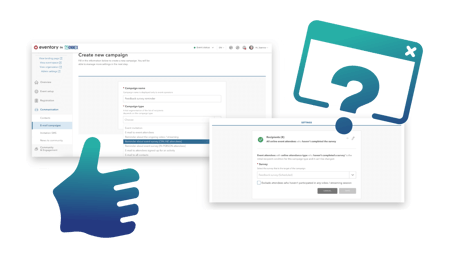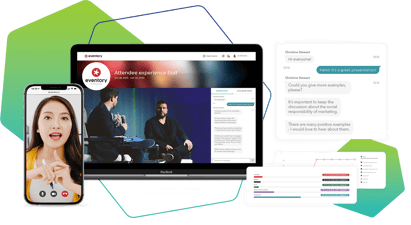60 Event Survey Questions to Ask Your Attendees for Effective Feedback

Events are powerful tools for connection, but their success hinges on execution. Whether you’re organizing an in-person event, a webinar, or a combination of both, your primary goal is to captivate and energize your audience.
But how can you ensure your event truly resonates?
The Power of Feedback
The answer lies in feedback. You gain invaluable insights by incorporating event survey questions at various stages — before, during, and after the event. It’s worth noting that 91% of event organizers measure their event’s success by attendee satisfaction.
Achieving a standout event means attending to every detail, from selecting the right virtual event platform to actively seeking out attendee feedback. When all these elements align, you’re on track to deliver an unforgettable experience.
It’s important to consider how your questions’ diversity can make a significant difference. Different attendees have varied perspectives, and capturing these can provide a holistic view of your event’s impact. Timely feedback can help address any immediate concerns, ensuring a smooth and enjoyable experience for all.
Apart from diversity, tailoring your questions to each event phase for the most relevant insights is crucial for event feedback and satisfaction. Ready to enhance your event planning and engagement? Dive into our curated list of impactful event survey questions and harness the power of informed decision-making.

Different Types of Event Survey Questions
The event survey questions serve as a guideline on how the event attendees, sponsors, and staff perceive the event. The top types of questions to ask for event survey feedback are:
NPS Questions
NPS (Net Promoter Score) measures customer loyalty and satisfaction. The NPS survey questions are in a multiple-choice format, and the audience can rate the items on a numeric scale.
But an NPS survey is more than just quantitative customer ratings; they also have qualitative value. With NPS questions, you can add follow-up questions based on the answers to understand the reason behind the scoring. It’s important to note that although similar to the Likert Scale responses, NPS event survey questions usually result in a single calculated value, which may not apply to all.
Example: On a scale of 0 to 10, how likely are you to recommend this event to a colleague or friend?
Yes-No Questions
Yes-no questions are quick and easy to implement as this binary questionnaire demands a straightforward answer. You can follow up a “yes-no” type event survey question with an open-ended question. This transition allows participants to evolve from a basic binary response to a more nuanced account.
Derive a more comprehensive narrative instead of a limited response and use the “yes-no” type event survey questions to get the participants hooked instead of bombarding them with questions from the start.
Example: Were you able to actively engage with the event?
Multiple-choice
Multiple-choice questions offer a set of predefined answers, allowing respondents to select one or more options that best describe their feelings or opinions. This type of event survey question is beneficial when you have specific answers in mind and want to categorize responses easily. They are less open-ended than open-text questions but offer more variety than yes-no questions.
Multiple-choice questions can be used to gauge preferences, identify patterns, or gather demographic information. They can be analyzed quantitatively, making them suitable for larger events where you expect a high number of responses.
Example: Which of the following sessions did you find most informative?
- Keynote speech
- Workshop on event management
- Panel discussion on industry trends
- Networking session
Open-Ended Questions
Open-ended questions are a great solution if you require more than one-word answers or ratings. The open-text format of these event survey questions allows the respondents to provide feedback in their own words. You can also analyze the responses to these questions at scale through spreadsheets or automated engagement tools.
You receive much more meaningful replies once you go beyond the stock answer options, allowing for better sentiment analysis. Although challenging to analyze, these event survey questions can provide highly qualitative feedback. It’s important to note that while these types of questions are useful, open-ended questions have a high threshold for users to pass and not answer.
Example: Which event segment did you enjoy the most and why?
Categorizing Event Survey Questions: Pre, During, and Post-Event Insights
There are three general types of event survey questions:
- Pre-event survey questions: These allow you to focus on finding out what your audience wants so you can deliver a better experience.
- In-Event Questions: These allow you to gauge specific speakers or sessions and ensure attendees aren’t having problems navigating your event.
- Post-event survey questions: After things wrap up, you want to evaluate different elements and use the information for future event planning.
Pre-Event Survey Questions
The pre-event survey questions set the stage for understanding attendees’ expectations, including their views on sustainability. These questions are vital for in-person, virtual, or hybrid events, offering insights before the event starts.
By gauging excitement, interest, and sustainability priorities, organizers can tailor the event to meet the modern audience’s values.
Here are some excellent examples:
1. What is your job title?
Gain insights into the professional backgrounds of attendees to tailor content effectively.
2. How did you learn about this event?
Determine the most effective promotional channels.
3. How did you find the registration process?
Ensure a seamless registration experience for attendees.
4. If it’s a virtual or hybrid event, have you used a virtual event platform before?
Gauge familiarity with the virtual format to customize the user experience and ease of access.
5. What are you hoping to gain from this event?
Align the event content with attendees’ goals and expectations.
6. What could enhance the value of this event for you?
Gather feedback to make last-minute adjustments or plan future events.
7. Are there any specific topics you’d like covered during the event?
Curate content that resonates with attendees’ interests.
8. Do you wish to interact with fellow attendees? If so, how would you prefer to engage?
Understand attendees’ networking preferences.
9. Which device will you use to join the event?
Ensure optimal user experience across various devices.
10. Which social media platform do you prefer for event updates and engagement?
Optimize social media strategies for maximum reach and engagement.
11. Which time slot is most convenient for you?
Schedule the event to your attendee’s preferences to maximize participation.
12. Do you have any suggestions for making the event more sustainable or eco-friendly?
Gather ideas to make the event more environmentally responsible and appeal to eco-conscious attendees.
13. Do you have any technical or physical concerns about attending?
Address potential technical or physical issues in advance.
14. Would you appreciate any pre-event content or activities to prepare for the event?
Enhance the pre-event experience with relevant content.
15. Have you attended a similar event in the past?
Avoid content repetition and cater to diverse attendee experiences.
16. Was it easy to access all event-related information when registering?
Ensure attendees can easily find all necessary event details.
17. What influenced your decision to opt for virtual participation over in-person attendance (or vice versa)?
Understand the motivations behind the choice of event format. For example, are you looking to be sustainable by choosing to join virtually over in person?
18. Would you be interested in sponsorship or exhibitor opportunities?
Identify potential sponsors or exhibitors early on to enhance the event’s offerings.
19. What are your preferred methods of communication for event updates? (Email, SMS, App notifications)
Optimize communication channels based on attendee preferences.
20. Are there any speakers or industry experts you’d like to see at the event?
Tailor the event’s speaker lineup based on attendee interests.

Strategic Survey Questions to Ask During an Event
Gathering feedback during an event is crucial for immediate improvements and tailoring the experience to attendees’ needs. Dive into these strategic questions to ensure your event is on the right track and resonates with your audience.
21. How effective was the (input title of) presenter or segment?
This question helps gauge the impact and effectiveness of each presenter or segment, allowing for real-time feedback.
22. Were the insights provided both pertinent and actionable for you?
Understanding if the content is actionable for attendees ensures that the event delivers practical value.
23. Did this segment meet your expectations?
This helps in assessing if the content aligns with what attendees were hoping to gain.
24. On a scale of 1–10, how would you rate the relevance of this session to your needs?
You can measure how closely the session aligns with attendees’ interests or needs by asking this.
25. Are the topics being covered beneficial and relevant to you?
This question aims to determine if the event’s content resonates with the audience’s needs.
26. How can we enhance your event experience right now?
Immediate feedback can lead to real-time improvements, enhancing attendee satisfaction.
27. Is there anything specific you require assistance with?
This ensures attendees have all they need and feel supported during the event.
28. How do you feel about the event’s pacing?
This helps organizers understand if the event is moving too fast, too slow, or just right.
29. Are the event facilities meeting your expectations?
Feedback on logistics can be crucial for immediate rectification and future event planning.
30. How would you rate the networking opportunities so far?
Networking is a key component of many events, and understanding its effectiveness can be vital.
31. Is the event technology (e.g., apps, AV) working well for you?
Ensuring that tech components run smoothly can greatly affect the overall event experience.
32. Would you like more interactive sessions or workshops?
This gauges interest in more hands-on or collaborative segments.
33. How clear has event communication been for you?
Clear communication is crucial for a seamless event experience.
34. Are there specific topics or speakers you hope to see in the upcoming sessions?
This can guide last-minute adjustments or planning for future events.
35. How comfortable are you with the event’s safety and health protocols?
Especially relevant in certain contexts, this ensures attendees feel safe and cared for.
36. Would you recommend this event to a colleague or friend right now?
This can be an early indicator of the event’s overall success and attendee satisfaction.
37. How do you feel about the diversity and inclusivity of the event?
Ensuring diverse representation and an inclusive environment is crucial for modern events.
38. Are there any barriers you’re facing in accessing event content or sessions?
Identifying and rectifying accessibility issues can be crucial for attendee satisfaction. Remember, the goal of these questions is to gather real-time feedback, allowing for immediate improvements and ensuring a successful event.
Now, let’s talk about the survey questions to ask after an event.
Post-Event Survey Questions
Gathering feedback after an event is paramount to understanding its success and areas of improvement. If you’re wondering what survey questions to ask after an event, here are some comprehensive post-event survey questions to help you gauge attendee satisfaction, insights, and preferences:
39. Which segment of the event did you find most engaging?
This helps identify the highlights and most impactful parts of your event.
40. Were there any elements of the event that didn’t resonate with you?
Pinpointing less successful aspects can guide future event planning.
41. How would you rate the networking opportunities presented?
Networking is vital to many events; understanding its effectiveness is crucial.
42. Would you consider participating in a similar event in the future?
This question gauges the overall appeal and success of your event. If answered negatively, the follow-up question, “If not, why?” can provide valuable insights.
43. Based on your experience, how eager are you to join future events?
This measures the likelihood of repeat attendance, indicating overall satisfaction.
44. Would you recommend this event to peers?
Recommendations are a strong indicator of event success and can also serve as organic promotion.
45. What topics or themes would you be interested in for upcoming events?
This helps in tailoring future event content to audience preferences.
46. Did you find the event sign-up and process user-friendly?
A smooth registration process enhances the attendee experience from the outset.
47. Were the event communications, both pre-and post, clear and informative?
Clear communication is essential for setting expectations and providing necessary information.
48. Were there specific aspects of the event you did not like?
This question delves deeper into potential areas of dissatisfaction.
49. What promotional materials or advertisements did you encounter before the event?
Understanding which marketing channels are most effective can guide future promotional strategies.
50. How intuitive was the event registration webpage?
Ensuring easy navigation enhances the initial attendee experience.
51. How do you perceive the value of the ticket price?
This assesses if attendees felt they received good value for their investment.
52. What key takeaways or insights did you take from the event?
Understanding what attendees learned helps in evaluating the content’s effectiveness.
53. Did you engage or interact with any of our sponsors? If so, which ones?
This assesses the effectiveness of sponsors’ engagement strategies and the quality of their interactions.
53. Would you like to see more information or sessions related to our sponsors in future events?This helps determine if attendees are interested in deeper engagements or learning opportunities related to sponsors.
54. Overall, how satisfied are you with the event?
A general satisfaction metric provides a broad view of the event’s success.
56. What areas do you believe need enhancement?
Feedback on areas of improvement is invaluable for future event planning.
57. Would you like to offer any additional feedback or comments?
An open-ended question allows attendees to share any thoughts not covered by previous questions.
58. How did you find the event’s duration?
This helps in optimizing the timing for future events.
59. Were the event’s resources and materials helpful?
Ensuring that supplementary materials are beneficial enhances the overall event experience.
60. Do you prefer salsa or guacamole with your chips?
Okay, this really isn’t a valuable question, but really, salsa or guac?
Remember, the objective of event feedback surveys is to gather comprehensive suggestions to refine and improve future events so you can put on the best events ever.

Best Practices for Event Surveys
Gathering event feedback is essential, but the approach matters. It’s not just about the questions you ask but how you present them to make sure you’re able to participate and give valuable insights. Here are some best practices to consider:
- Question Count: Balancing the number of questions in your survey is crucial. While as an event organizer, you might be tempted to ask over 20 questions, attendees are unlikely to spend that much time. The fewer questions you pose, the higher the likelihood of receiving responses. SurveyMonkey suggests a median of ten questions. Strive for a range of 3–12 questions. Remember, an overloaded survey can lead to higher abandonment rates.
- Diverse Question Formats: While event organizers lean towards open-ended questions because they provide depth, attendees often find them time-consuming and challenging. Diversify your question formats to enhance engagement. Incorporate yes/no, multiple choice, ranked choice, ratio-scale questions, and more.
- Digital Surveys: Gone are the days when paper surveys were the go-to. The rise of digital communication has made virtual surveys the new norm. McKinsey points out the sustainability of virtual surveys. Benefits include:
- Speed: Instant access and promotion across various channels like email, social media, and apps.
- Analysis: Real-time results and in-depth automated data insights.
- Cost-Effectiveness: Eliminate paper and printing expenses and reduce manpower.
- Security: Enhanced data protection with password controls.
- Timeliness: Capture feedback when the event experience is fresh. Begin promoting your survey on the event’s final day, distributing it through emails, apps, or even in person. Consider pre-event surveys to shape the agenda based on attendee preferences, from suggesting speakers to choosing music genres. Such proactive measures ensure a tailored event experience.
- Pre-Event Surveys: While these aren’t feedback, they allow attendees to influence the event’s agenda. Some organizations use pre-event feedback polls to prepare suitable transportation, arrange hotel rooms, or learn about the type of music attendees would like to have. This can help in tailoring the event more closely to attendees’ preferences.
- Reminders: A well-crafted survey is just the beginning. Engaging attendees to participate is the next step. Utilize the strategies mentioned above, and don’t underestimate the power of reminders. For instance, two similar events using Eventory by 6Connex showed varying feedback rates. The event with reminders garnered 749 responses from 100 attendees, while the other received only 108. Sending notifications on the event’s last day and a few days post-event can significantly boost participation.
- Incentives: Everyone loves a token of appreciation. Encourage survey participation with small giveaways like pens, notebooks, or mugs. If your budget allows, consider hosting a raffle for survey participants, offering more substantial rewards like gift cards..
Incorporating these best practices can significantly enhance the quality and quantity of feedback you receive, ensuring your future events are even more successful.

Maximizing Event Success with the Optimal Event Survey Platforms
Crafting impactful event survey questions is an art that demands meticulous planning. When considering what to include in a post-virtual event survey, it’s pivotal to design questions that yield actionable insights. These insights can significantly influence the success of your event and amplify attendee satisfaction.
The choice of software plays a decisive role, especially for virtual or hybrid events. It’s not just about collecting responses; it’s about creating an immersive environment that facilitates engagement. While there are several event survey platforms available, 6Connex stands out with its built-in survey functionality. This integrated feature ensures that you don’t need to juggle between multiple tools, offering a streamlined experience for both organizers and attendees.
Other notable platforms include SurveyMonkey, Typeform, and Google Forms. However, the seamless integration of the survey function within the 6Connex platform and its open universe integrations offers a distinct advantage, making it a top choice for event professionals seeking efficiency and effectiveness.
Take Advantage of the 6Connex Event Management Platform
Crafting the perfect event experience is an art, and with Eventory by 6Connex, you have the palette and tools to paint a masterpiece. This state-of-the-art platform empowers you to host transformative events that captivate and engage your audience.
Eventory is not just about hosting; it’s about creating memorable experiences. With its intuitive features, you can share compelling keynotes via recorded presentations, foster deeper connections with breakout sessions, and push event surveys to gather real-time feedback and get the best insights possible.
Beyond the event, the platform’s tech integrations, such as webcast capabilities and live streaming, allow you to extend the event’s reach and impact. Plus, with Eventory’s suite of mobile event apps, attendees can dive into the event experience from anywhere, anytime.
But what truly sets Eventory apart is its comprehensive suite of tools that streamline every aspect of event management. From promoting your event with email campaigns and managing digital ticketing to analyzing ROI, Eventory has got you covered. And with the added advantage of 6Connex’s trusted reputation and security, you’re assured of a reliable, innovative platform designed for success.
Increase Event ROI with 6Connex’s Engaging Platform
Crafting the perfect event experience is more than just setting an agenda; it’s about engaging your audience every step of the way. The 6Connex platform is designed to ensure that your virtual events are not just another online meeting but a transformative experience. With the platform’s advanced AI event technology, you can create personalized experiences in real-time, tracking attendee behavior to recommend networking matches and provide relevant content tailored to each individual user.
But what truly sets 6Connex apart is its emphasis on enhancing your attendee’s experience. With its suite of tools and open universe, you can:
- Connect Meaningfully: Utilize messaging and video chat features to foster direct connections between attendees, sponsors, and presenters. Plus, with AI Matchmaking, attendees can find contacts and content that align with their interests, reducing search time and enhancing their overall experience.
- Orchestrate Interactive Content: From live and pre-recorded presentations to webcasts available in over 100 languages, 6Connex ensures your content reaches and resonates with your audience. Amplify your sponsors’ impact with promotional tools, booths, and more.
- Gamify the Experience: With 6Connex’s gamification tools, you can plan scavenger hunts, set up branded photo booths, and even integrate music through Spotify to set the perfect mood. These micro-moments ensure attendees remain engaged and invested in the event.
- Measure and Optimize: Real-time reporting tools allow you to monitor audience participation, spotlight your best content, and truly understand what drives engagement. This data-driven approach helps refine the current event and provides invaluable insights for future events, ensuring a continuous increase in ROI.
For those looking to elevate their event’s ROI, it’s essential to have the right event survey tools. In their virtual event solutions, 6Connex has a built-in survey function, allowing organizers to gather real-time feedback seamlessly. Event feedback is crucial in understanding attendee satisfaction, preferences, and areas of improvement, further enhancing your future event’s success.
In the world of virtual, hybrid, and in-person events, where audience engagement is a challenge, no matter the format, 6Connex offers a comprehensive event solution. From its state-of-the-art AI technology to its gamification and engagement tools, 6Connex ensures that your events are not just successful but memorable.
Mastering Event Surveys: Harness the Power of 6Connex
Choosing the right platform for gathering this feedback is crucial. 6Connex stands out with its integrated survey functionality, streamlining the feedback process. Beyond surveys, 6Connex ensures a holistic event experience, from content delivery to real-time engagement to real-time data and analysis. From AI Matchmaking to gamification, ensure your next event is memorable and impactful.
Ready to redefine your event experience? Schedule a demo with 6Connex today to see the difference.

References
https://info.6connex.com/blog/18-important-survey-questions-to-ask-your-event-attendees
https://blog.hubspot.com/marketing/post-event-survey-questions
https://www.bizzabo.com/blog/event-survey-questions
https://www.surveymonkey.com/mp/post-event-survey-questions/
https://www.questionpro.com/blog/event-feedback-survey-questions/#:~:teue%3F
https://www.retently.com/blog/nps-survey-templates/
https://www.hotjar.com/net-promoter-score/survey-questions/
https://www.surveymonkey.com/curiosity/watch-the-pros-and-cons-of-a-yes-no-question-type/
https://www.surveymonkey.com/mp/likert-scale/
https://www.hotjar.com/blog/survey-questions/
https://blog.slido.com/how-to-increase-audience-engagement-events/
